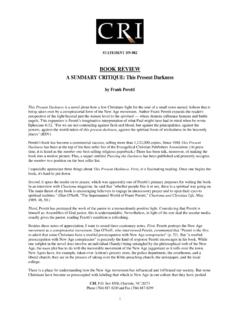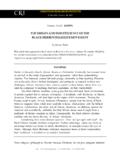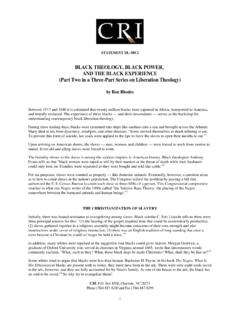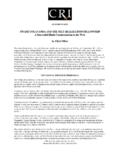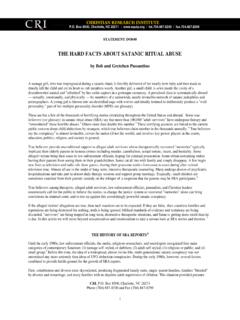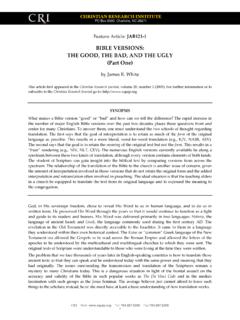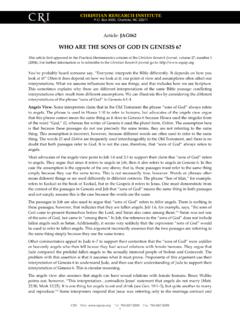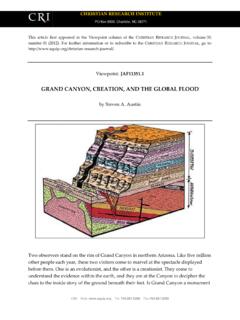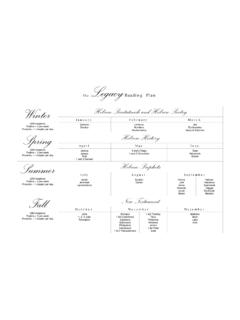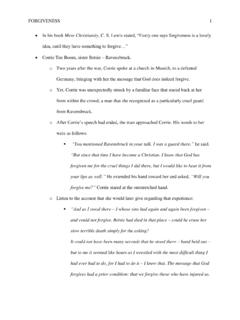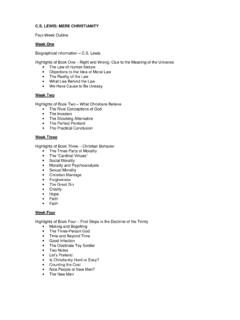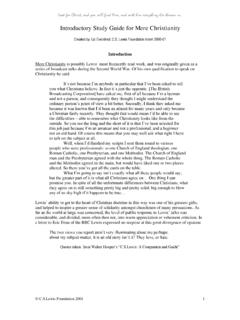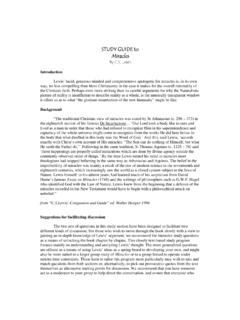Transcription of BEYOND MERE CHRISTIANITY: AN ASSESSMENT OF C. S. …
1 RESEARCH Box8500,Charlotte, NC 28271 Feature Article:JAL400 BEYOND mere CHRISTIANITY: AN ASSESSMENT OF LEWISby Steven P. MuellerThis article first appeared in theChristian Research Journal, volume 27, number 4 (2004). For further information or tosubscribe to theChristian Research Journalgo to: S. Lewis was one of the most influential Christian apologistsof the twentieth century, and he remainsinfluential today. His apologetic works explain essential Christian teachings in ordinary, nontechnicallanguage, and his writings usually focus on beliefs that all Christians hold in common what he called mere christianity . He thought this approach would best serve those who did not know Jesus they came to faith, Lewis believed, they would learn about theological differences betweenchurches and join a Christian fellowship of their claimed to have limited his apologetic writings to mere christianity ; however, there were timeswhen he addressed teachings that are not held by all Christians.
2 He believed, for instance, that Scriptureis in some sense the word of God, but he questioned itsinerrancy. He also believed in the existence ofpurgatory, though he did not consider it to be a place of punishment. Lewis, rather, believed savedpeople were purified of their sins in purgatory before entering heaven itself. Another controversial beliefhe held was that a person could belong to Jesus Christ and be saved without necessarily knowing Himspecifically. This is not exactly universalism, but it goes BEYOND the clear teaching of full consideration of Lewis needs to include his strengths and his weaknesses. A discerning reader canrecognize that many of his writings and strategies are helpful and are a valuable contribution to apologeticsand theology while also recognizing that some of his teachings go BEYOND the scope of S. Lewis (1898 1963) is often called the foremost Christian apologist of the twentieth century.
3 His manywritings have introduced countless people to the Christian faith. Apologetic works such asMere christianity ,Miracles,andThe Problemof Painexplain and defend essential beliefs of christianity . Children s stories from theChronicles of Narnia recast biblical themes, enabling readers to consider them from new perspectives. Popularbooks, such asThe Screwtape Letters,have given many people ample material for thought believed that theology should be accessible to any Christian who was willing to read and clear, concise writing addresses significant theological issues and invites the reader to explore agreater depth of faith. Consequently, many Christians from a variety of denominational backgroundsnote Lewis s influence on their own conversion and the decades since his death, Lewis s books have remained popular, but they are not withouttheircritics. Some from outside of christianity dislike his works because of their biblical message, but criticalvoices have emerged from within christianity as a reader encounters a description of christianity that resonates with his or herown understanding,that reader may conclude that the writer shares his or her theological perspective.
4 Further reading, , may reveal some surprising contrasts. Lewis s readers are often confused by unexpectedteachings in his books. How should onerespond to a writer who shared some remarkable insights butwho also presented some questionable teachings?Some readers consider any critical ASSESSMENT of Lewis to be inappropriate, not wanting a champion ofChristian outreach to be disparaged. This concern is legitimate. Lewis s significant accomplishmentsshould not be overlooked, but the opposite error is equally troublesome. Concealing or ignoring hisshortcomings does no service to Lewis or the truth he defended. Lewis was not an inerrant writer, norwas he the ultimate theological authority. He was a human being who made a significant contribution,but his writings contain some flaws. A legitimate ASSESSMENT of Lewis must account for S APOLOGETICSL ewis offered a diverse yet consistent presentation of christianity .
5 Through many literary genres (types)and in a variety of settings, he winsomely presented his faith to a modern audience. Though raised in aChristian home, Lewis abandoned his faith at a young age and became a self-professed atheist. He hadmany objections to christianity and did not return to it until these objections were answeredsatisfactorily. With those answers, he answered the objections of others. His writings, therefore, focus onthe most essential teachings of christianity and on obstacles that unbelievers often of these obstacles are addressed in his apologetic works: Is there a universal moral law? If so, mustthere also be a universal moral lawgiver? Is the universe a closed system, or is supernatural interventionpossible? Is it logical to consider Jesus to be a good ethical teacher while denying His deity? Can miraclesreally occur? How can an omnipotent God allow suffering and still be good?
6 Lewis addressed suchquestions with candor and , moreover, translated theology into ordinary speech, making it more intelligible to laypeople. Partof the reason Lewis was able to do this is because he was a layman. He did not make his living fromreligious writing but from his secular professorship. This outsider status helped make him a moreengaging and effective factor contributing to Lewis s effective apologetic was his diverse style. Lewis used everyavenue available to him to present his faith. His nonfiction books directly address theological , his fictional works present significant religious themes. His speeches, essays, and letters showthat his faith was an essential part of his life. Even his academic works present Christian themes whenthey are appropriate to the subject at hand. Lewis used his entire life as a platform for sharing his beliefin Common HallMuch of the success of C.
7 S. Lewis s apologetics, and his writing in general, lies in its focus. Lewis knewhow to precisely delineate a topic and focus his writing. This precise focus is evident throughout hisworks. In the preface toMere christianity , Lewis explicitly noted his purpose: The best, perhaps the only,service I can do for my unbelieving neighbours [is] to explain and defend the belief that has beencommon to nearly all Christians at all times. 1He decided not to discuss differences betweendenominations or attempt to convert anyone to his own Anglican faith. Instead, he presented the basicteachings of orthodox christianity teachings he labeled mere christianity . Lewis had three motives for this focus: First, he believed that the disputed doctrines required a depth oftheological and historical understanding that he did not possess. He humbly considered others betterqualified to discuss such topics.
8 Second, Lewis said that this type of writing, while important for those whoare already Christians, would not bring unbelievers into the church. His goal was not to persuade thosewho were debating which denomination to join or whichcongregation to attend; rather, he wrote for thosewho did not know Jesus Christ. Third, he noted that many writers already addressed the controversialpoints, but few focused on the emphasis on common teachings makes Lewis quite find that he presents thecentral beliefs of christianity clearly. Christians generally find significant agreement with his readers, unfortunately, do not take to heart what Lewis said about the limits of hisapproach:I hope no reader will suppose that mere christianity is here put forward as an alternative to thecreeds of the existing communions as if a man could adopt it in preference to Congregationalismor Greek Orthodoxy or anything else. It is more like a hall out of which doors open into severalrooms.
9 If I can bring anyone into that hall I shall have done what I attempted. But it is in the rooms,not in the hall, that there are fires and chairs and meals. The hall is a place to wait in, a place fromwhich to trythe various doors, not a place to live in. For that purpose the worst of the rooms(whichever that may be) is, I think, common hall of christianity the teachings and practices shared by all Christians is not theend. Christians should rejoice in this commonality but not overlook the significant challenges thatremain. Lewis encouraged those who have entered the common hall to seek a room where truedoctrine and holiness may be found, but he gave little counsel on which room to choose. He left that taskto others. He did, however, caution Christians to be charitable toward those who dwell in other roomsand those who had not yet found a room of their of the Common HallLewis s common hall is a helpful illustration ofthe common faith of the church, but it is accompanied bytwo challenges.
10 First, who determines what is common to all Christians? No individual Christian canexpress what is common only in terms of his or her church or his or her own particular beliefs. Lewis,consequently, was careful to note that his definition of mere christianity was not intended to be asummary of Anglicanism (though Anglican influences on Lewis s work are evident), nor was it meant tobe a complete summary of his own faith. Some (including myself) have suggested that the ecumenicalcreeds comprise a summary of essential christianity , yet not all Christians formally acknowledge thecreeds. It may be simply that each reader has his or her own definition of mere christianity throughwhichhe or sheevaluatesLewis s words; but, if the definitions vary, does a common hall truly exist?It is clear, moreover, that not all Christians share Lewis s beliefs on certain points. We will consider threeof them: the authority of Scripture, the existence of purgatory, and the inclusivity of salvation.
